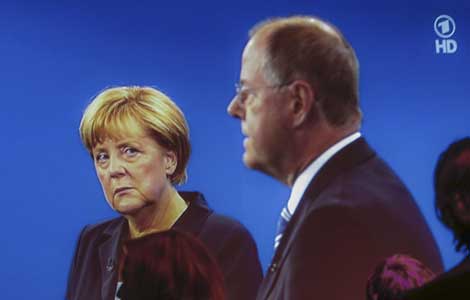Anti-monopoly efforts
Updated: 2013-08-26 09:40
(China Daily)
|
||||||||
China is ramping up anti-monopoly law enforcement, a move that serves the country's pursuit of building a rule- and competition-based market economy.
Early this month, anti-trust regulators fined six dairy firms, mostly foreign, for alleged illegal pursuit of higher market shares through "vertical monopoly".
Vertical monopoly refers to behavior of a company that controls its production and distribution channels to forbid price cuts and prevent competition in the market.
Before that, global healthcare giant Johnson & Johnson was fined for minimum-price setting for surgical instrument sales.
While speculation has arisen that the country is making use of anti-trust moves to prevent foreign companies from expanding their foothold in the world's largest consumer market, regulators have announced their intention to target the petroleum, telecommunications, banking and auto sectors, which may concern mostly domestic enterprises.
And in previous investigations of industries such as publishing, insurance, liquor and gold jewelry, private, State-owned as well as foreign enterprises have been fined for violations of the anti-trust law. There is no evidence that foreign companies alone are been targeted in the investigations.
China's anti-monopoly investigations aim to prevent enterprises with a leading market position from abusing their position and having an adverse effect on the building of a competition-based market economy and harming the interests of consumers.
As China's market economy matures, such investigations could become routine, and market players, whether domestic or foreign, should make thorough assessments of whether their operations violate the country's anti-monopoly law before they start to implement competition strategies.
While such assessments might not have been necessary in the past, today they cannot be ignored.
Given China's short history of enforcing its anti-trust law - the anti-monopoly law was promulgated only four years ago and it was not until 2011 that the government established the anti-trust bureau - some foreign enterprises' concerns about, and distrust of, the country's anti-trust investigations are understandable.
Regulators, as they push their anti-trust drive, should strengthen information disclosure to alleviate such concerns. They need to clarify to the market what is behind their anti-monopoly moves and how they decide whether an enterprise is monopolizing the market or not.

 Experts: US unwise to wage war on Assad
Experts: US unwise to wage war on Assad
 Beijing prepares for September gridlock
Beijing prepares for September gridlock
 Merkel in TV debate with rival before election
Merkel in TV debate with rival before election
 A down-to-Earth lesson
A down-to-Earth lesson
 Pupil workload should shrink in new semester
Pupil workload should shrink in new semester
 Obama delays strike against Syria
Obama delays strike against Syria
 Games start is grand, without grandstanding
Games start is grand, without grandstanding
 Southwest rattled by second quake
Southwest rattled by second quake
Most Viewed
Editor's Picks

|

|

|

|

|

|
Today's Top News
Sowing the seeds of sustained growth
China-Turkmenistan ties becoming strategic
Obama to use G20 for Syria attack justification
Experts: US unwise to wage war on Assad
SASAC head target in graft probe
Eurasian nations focus on Net
Manufacturing sees quick expansion
Lack of safety training blamed for deaths
US Weekly

|

|






